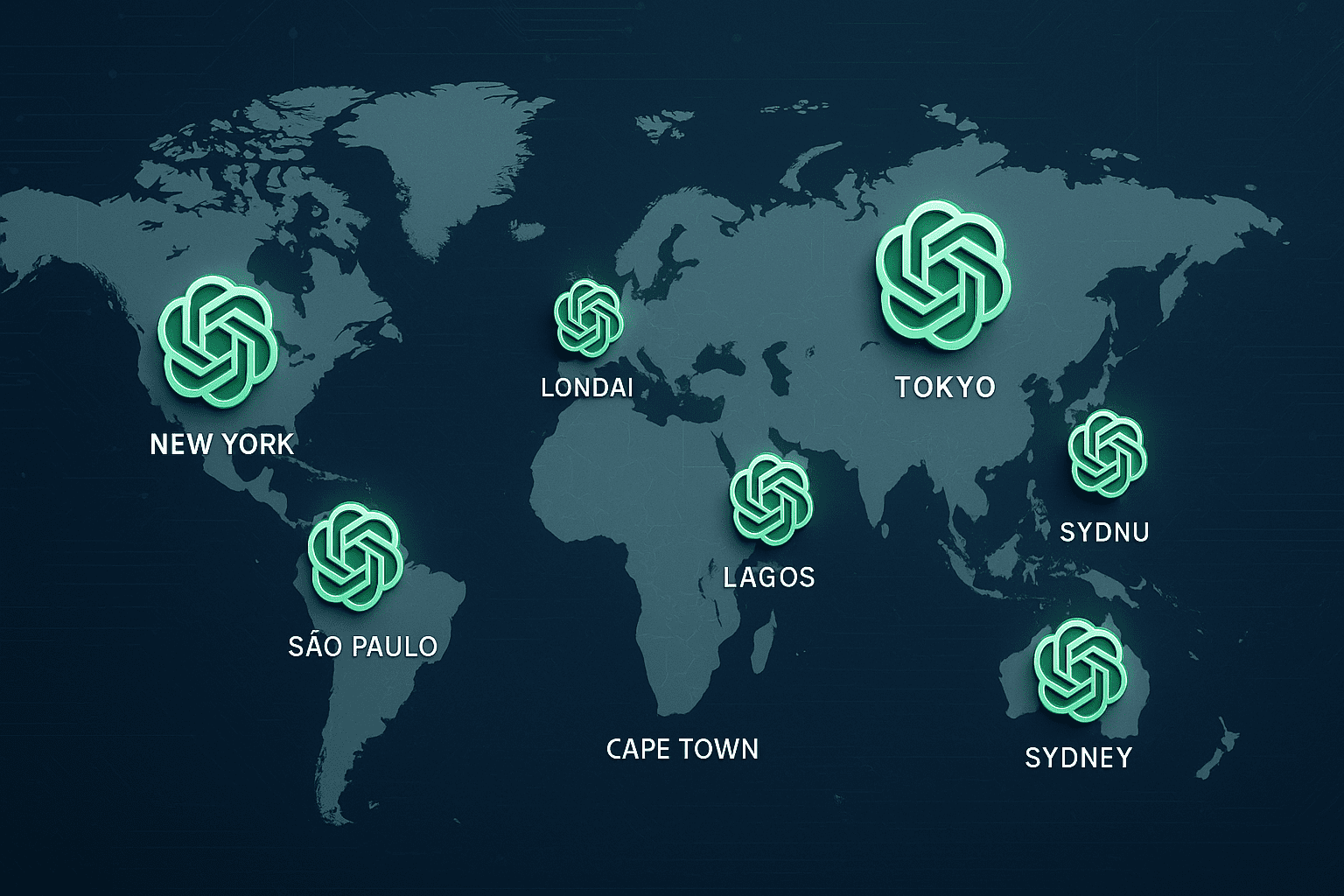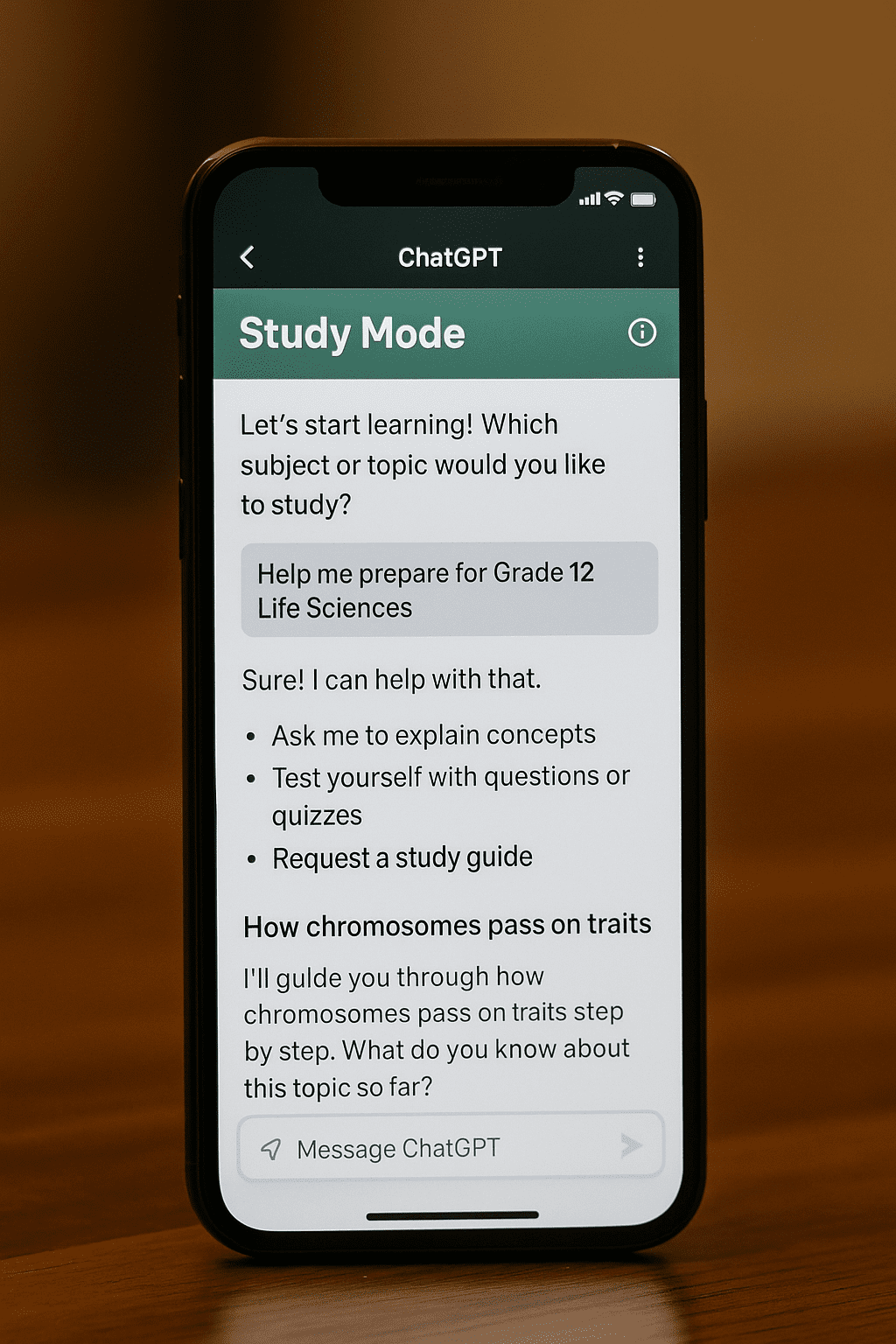ChatGPT’s Economic Impact in 2025: OpenAI’s Report Reveals a Productivity Change

ChatGPT’s Economic Impact in 2025
In July 2025, OpenAI released its inaugural economic analysis of ChatGPT, offering a new glimpse into how generative AI is reshaping work, productivity, and the broader economy. Titled “Unlocking Economic Opportunity: A First Look at ChatGPT-Powered Productivity”, the report combines real-world data, comprehensive surveys, and expert insights to measure how ChatGPT is already fundamentally changing how people work — spanning diverse environments from classrooms and government offices to bustling law firms and nascent small businesses.
In this in-depth article, we unpack the key findings of OpenAI’s groundbreaking report, explore its profound implications for the future of work, and meticulously analyze why ChatGPT’s economic impact in 2025 positions it as one of the most disruptive and empowering technological tools since the very advent of the internet itself. This analysis sheds light on a true productivity revolution, echoing the transformative power of previous general-purpose technologies.
A Global Tool With Local Impact: ChatGPT’s Broad Reach
Since ChatGPT’s public launch, its usage has exploded across continents and demographics at an astonishing pace. OpenAI’s analysis compellingly shows a staggering 800 million weekly active global users, engaging in an astonishing 2.5 billion messages exchanged daily. In the United States alone, a significant 330 million messages are sent each day, underscoring its deep penetration into a major global economy. These are not just casual, ephemeral interactions; a substantial and growing number of users are actively integrating ChatGPT into their professional workflows, unlocking measurable gains in efficiency, enhancing the quality of their output, and fundamentally altering their daily tasks. The report notes that 20% of US adults now use ChatGPT for work-related tasks, a significant increase from 8% in 2023.
The real-world application of ChatGPT has yielded impressive, quantifiable results. For instance, in the education sector, teachers are reportedly saving up to 6 hours per week. This remarkable time-saving is largely achieved by automating or significantly streamlining traditionally time-consuming tasks such as lesson planning, the arduous process of grading assignments, and the creation of differentiated learning materials tailored to individual student needs. This reclaimed time directly translates into more valuable student-facing interactions, an enhancement in overall lesson quality, and, crucially, improved job satisfaction for educators who can now focus on the more rewarding aspects of their profession. Teachers are finding AI particularly useful for generating quizzes, summarizing complex texts, and brainstorming creative project ideas, allowing them to truly innovate in their teaching methods. This practical impact underscores a key facet of ChatGPT’s economic impact in 2025.
How Governments Are Embracing AI for Public Service Efficiency
One of the most compelling and insightful case studies highlighted in the report comes from the public sector, specifically the state of Pennsylvania in the United States. In a pioneering partnership with OpenAI, government employees participated in a pilot program that seamlessly embedded ChatGPT into their daily administrative functions. The results were nothing short of transformative: workers saved an astonishing average of 95 minutes per day. This isn’t merely about personal time-saving; it signifies a profound systemic improvement in how governments can operate with greater efficiency, enhance their responsiveness to citizens, and foster increased transparency in public service delivery. The pilot revealed that 36% of participants used AI for writing assistance, text generation, and drafting emails, significantly reducing time on these tasks.
Importantly, the report emphasizes that these substantial productivity gains did not, in any way, compromise job quality or erode public trust. Quite the opposite, employees involved in the pilot reported demonstrably higher job satisfaction and significantly more bandwidth. This newfound capacity allowed them to dedicate their focus to more complex, intellectually stimulating, and inherently human-facing tasks, such as critical policy development, in-depth strategic planning, and meaningful community engagement initiatives. This exemplifies how AI can augment, rather than simply replace, human capabilities in the public sphere, creating a more dynamic and effective governmental apparatus. The Pennsylvania pilot’s success is seen as a blueprint, with leaders hoping other states will learn from their approach to integrate generative AI safely and effectively into public administration.
Real Results Across Professional Sectors: A Comprehensive Overview
OpenAI’s report aggregates a rapidly growing body of independent academic studies and empirical observations, consistently confirming ChatGPT’s transformative effects across a wide array of industries. Here’s a detailed breakdown by key sectors, illustrating the breadth of ChatGPT’s economic impact in 2025:
Education:
- Time Savings: Teachers are consistently saving 6 or more hours per week on administrative and preparatory tasks.
- Enhanced Pedagogy: This increased time translates directly into more opportunities for personalized student feedback, innovative lesson design, and curriculum development. AI assists in generating diverse learning materials, customizing assignments, and even providing initial drafts for lesson plans, allowing educators to focus on the human connection and critical thinking.
- Equity and Access: ChatGPT helps bridge resource gaps, offering quality teaching tools that can enhance equity in access to high-quality educational materials and support for both educators and learners, regardless of their institutional resources. Studies show that AI-assisted education does not worsen existing social inequalities, offering a promising avenue for democratizing learning tools.
Legal & Consulting Services:
- Content Generation: Lawyers are demonstrating an impressive 140% increase in the volume of content they produce, often with simultaneously improved accuracy in legal research briefs, preliminary drafts of contracts, and client communications. AI can quickly summarize lengthy legal documents, identify relevant precedents, and even assist in drafting initial litigation documents, vastly speeding up processes.
- Research Efficiency: Consultants are reporting significant improvements in their speed and a substantial reduction (up to 25%) in the hours required for comprehensive research, data synthesis, and report generation. This means faster turnarounds on complex deliverables, directly boosting client satisfaction and allowing firms to take on more projects with existing staff. AI helps in quickly extracting key insights from vast datasets and preparing compelling presentations.
- Strategic Augmentation: Beyond rote tasks, AI assists in identifying legal precedents, summarizing lengthy documents, and even helping to craft persuasive arguments, elevating the strategic capacity of legal and consulting professionals by allowing them to focus on high-value, nuanced work.
Customer Support & Small Businesses:
- Faster Issue Resolution: Customer service agents are resolving issues approximately 13% faster, leading to higher customer satisfaction and lower operational costs for businesses. ChatGPT-powered chatbots can handle routine queries 24/7, provide instant access to knowledge bases, and draft quick, accurate responses, freeing up human agents for more intricate or emotionally charged interactions. Salesforce reports that companies using AI support tools see a 95% reduction in costs and time savings, with 92% believing AI improves customer service quality.
- Empowering Small Business Owners: Small business owners are leveraging ChatGPT for a myriad of essential tasks that traditionally required significant time or external hiring. This includes developing compelling marketing copy, designing effective social media strategies, streamlining basic financial planning and budgeting, creating detailed product descriptions, and even assisting with preliminary market research. Over 2 million businesses worldwide have integrated ChatGPT into their workflow.
- Reduced Startup Costs: Entrepreneurs across various industries report significant reductions in initial startup costs and ongoing operational expenses by effectively using AI tools as virtual team members or specialized contractors, rather than having to hire traditional freelancers or agencies. This lowers the barrier to entry for new ventures, fostering innovation and economic dynamism.
This widespread, cross-sectoral adoption clearly demonstrates that ChatGPT is not merely a niche productivity tool exclusively for tech-savvy industries. It is rapidly becoming a foundational utility, much like the transformative impact of electricity or the omnipresent utility of the internet itself. Its versatility and accessibility are turning it into a ubiquitous aid for professional functions, driving the profound ChatGPT’s economic impact in 2025.
Entrepreneurship in the Age of ChatGPT: A New Dawn for Business Creation
Perhaps one of the most exciting and forward-looking dimensions of OpenAI’s report is its explicit focus on the burgeoning landscape of small business formation and entrepreneurship. According to OpenAI’s rigorous internal data and a series of robust third-party surveys, nearly 40% of small business owners in the U.S. are now actively and regularly using ChatGPT as an integral part of their operations. Many of these successful entrepreneurs cite AI as absolutely instrumental in several critical aspects of their business journey:
- Accelerated Launch Timelines: AI tools enable entrepreneurs to rapidly prototype ideas, generate initial business plans, and craft foundational marketing materials at unprecedented speeds, significantly shortening the time from concept to market. This reduces the friction typically associated with new business formation.
- Dramatic Reduction in Overhead Costs: By automating or assisting with tasks like content creation, customer communication, and data organization, entrepreneurs can defer or even avoid significant hiring expenses for contractors or full-time staff in their early stages. Small businesses are reportedly saving up to 40% on operational costs by integrating AI automation.
- Enhanced Access to Global Markets: ChatGPT can facilitate communication and content creation in multiple languages, help with preliminary market research in diverse regions, and assist in tailoring products or services for international audiences, democratizing access to global commerce for even the smallest players.
- Streamlined Product Development Cycles: From brainstorming new product features to writing initial code snippets or generating design concepts, AI accelerates the iterative process of product development. This allows for faster innovation and adaptation to market demands.
Consider, for example, a burgeoning small e-commerce brand based right here in Johannesburg, South Africa. Traditionally, launching such a venture would require significant investment in professional services: a copywriter for product descriptions, a data analyst for inventory management, and a marketing agency for social media strategy. This hypothetical brand, however, leveraged ChatGPT to craft compelling product descriptions, efficiently manage complex inventory spreadsheets, and develop a comprehensive social media content calendar and engagement strategy. By effectively lowering these traditional barriers to entry – both in terms of cost and specialized skill requirements – ChatGPT is empowering more individuals to take decisive control of their economic destiny, fostering a vibrant ecosystem of innovation and job creation. This is a tangible manifestation of ChatGPT’s economic impact in 2025 on the ground, even in emerging economies.
The Rise of AI as Foundational Infrastructure
The sheer speed at which ChatGPT achieved mainstream adoption is truly unprecedented in technological history. It took a mere two months for ChatGPT to reach 100 million users. By stark contrast, the internet, which we now consider a universal utility, took roughly a decade to achieve the same milestone. This breathtaking pace firmly positions generative AI not as a fleeting niche innovation or a specialized tool, but rather as the unmistakable next foundational infrastructure layer for society and economy. Just as electricity grids and vast road networks underpinned industrial growth, and the internet enabled the information age, AI is poised to be the crucial bedrock for the next wave of global progress, enabling new forms of commerce, education, and governance.
OpenAI cogently argues that AI, much like essential public utilities such as roads or electricity, should be conceptualized and managed as a public good – a powerful enabler of opportunity and a catalyst for productivity across all layers of society. The core philosophy driving this perspective is that, rather than simply replacing human workers, AI possesses the unparalleled potential to profoundly amplify human capabilities and potential, helping individuals and institutions to achieve significantly more with fewer resources. This synergy between human intellect and AI augmentation is key to realizing broad-based economic benefits and ensuring that the economic pie expands for everyone.
The broader, more ambitious vision is to proactively integrate AI development and deployment into national and international strategies for comprehensive economic development. By doing so, governments, alongside private sector and non-profit partners, can unlock equitable access to these powerful productivity tools, catalyze innovation, and foster economic growth specifically within historically underserved communities and developing regions. This strategic integration is vital to ensure that the benefits of this technological revolution are widely distributed and contribute to global prosperity.
Addressing the Risks and Unknowns: A Balanced Approach to AI’s Future
While the transformative potential of AI for productivity and economic growth is immense, OpenAI acknowledges that this revolution, like all previous ones, comes with inherent risks and uncertainties. To ensure that this productivity revolution truly benefits everyone and avoids exacerbating existing societal inequalities, OpenAI has taken a proactive and responsible step. They have partnered with a distinguished panel of leading economists and policy experts to systematically address these critical concerns. This esteemed panel includes:
- Ronnie Chatterji: Chief Economist at OpenAI and a respected former White House economic advisor.
- Jason Furman: A highly regarded Professor at Harvard University and former Chair of the Council of Economic Advisers under President Obama.
- Michael Strain: The influential Director of Economic Policy Studies at the American Enterprise Institute, with a focus on labor market issues and a faculty member at Georgetown University.
Their collective mandate is to conduct a rigorous, comprehensive 12-month research project specifically focused on the multifaceted economic impact of AI. This research will delve into crucial areas such as potential labor displacement across various industries, the dynamics of income inequality in an AI-augmented economy, and avenues for enhancing economic mobility for all segments of the population. Sam Altman, OpenAI’s CEO, while optimistic about job creation, acknowledges that many existing jobs will disappear, making this research crucial for policy planning. This ambitious initiative is committed to producing publicly available data, in-depth analyses, and actionable policy recommendations. The overarching aim is to meticulously guide AI development and deployment in a human-centered, fundamentally inclusive, and ethically sound manner. This deliberate effort to understand and mitigate potential negative second-order effects signals a critical shift in how leading technology companies approach their innovations, moving beyond mere creation to encompass responsible stewardship and societal welfare.
Why This Matters for Content Creators and Businesses
From the strategic lens of SEO and digital marketing, the ChatGPT economic impact in 2025 report is pure gold. It illuminates several critical opportunities and trends for content creators, businesses, and digital strategists:
- New Content Opportunities: The report opens up a vast landscape for content creation. Bloggers, educators, tech writers, and industry analysts can now delve into highly relevant and trending niche topics. Examples include “AI in government efficiency,” “ChatGPT for small business growth strategies,” “Education 4.0: AI-powered learning,” “AI’s role in legal tech innovation,” or “Customer service automation with generative AI.” These topics are not only timely but also address specific pain points and interests, driving organic search traffic.
- High-Value Keyword Potential: Phrases directly related to the report and its implications are experiencing a surge in search volume. Keywords such as “AI productivity tools,” “ChatGPT for teachers,” “OpenAI economic impact,” “AI entrepreneurship,” and “future of work with AI” are highly valuable. Content optimized around these terms is likely to capture significant organic traffic from individuals and businesses actively seeking solutions and insights.
- Surge in User Demand for Practical Applications: The dramatic increase in workplace usage of ChatGPT (from 8% of employed US adults in 2023 to a striking 28% in 2025) signifies a massive surge in user demand. More professionals and businesses are actively searching for practical ways to integrate ChatGPT and other AI tools into their daily workflows, seeking tutorials, best practices, and use cases. This creates an enormous opportunity for content that provides actionable advice and solutions.
For South African entrepreneurs, tech bloggers, and local businesses, this global report provides a perfect moment to localize the conversation and establish regional authority. How precisely is AI transforming township economies, creating jobs, or addressing unique local challenges specific to the South African context? What does enhanced productivity mean in the specific context of intermittent power supply (load-shedding) or the persistent challenge of youth unemployment in South Africa? These are rich, currently underserved angles that, when explored thoroughly, can significantly boost local search traffic, enhance regional authority, and build a highly engaged audience relevant to the South African market.
Looking Ahead: The Future of Work, Reimagined by AI
The impressive productivity gains highlighted in the OpenAI report are, by all indications, only the beginning of a much larger transformation. As multimodal AI – systems capable of seamlessly combining and processing text, vision, voice, code, and other data types – becomes increasingly mainstream and sophisticated, an entirely new realm of possibilities will emerge, redefining how we interact with technology and how work is structured:
- Advanced AI-Powered Personal Assistants: Imagine highly intuitive personal assistants that not only manage your schedule and organize your communications but also proactively negotiate contracts, analyze complex documents, or even draft preliminary legislation based on your directives. These assistants will evolve to understand complex contexts and anticipate needs, making human-computer interaction more seamless than ever.
- Hyper-Personalized Education: AI will enable truly individualized learning experiences, where educational content, pace, and teaching methods are dynamically tailored to every student’s unique learning style, strengths, and weaknesses, fostering unprecedented educational outcomes. This could revolutionize skill acquisition and lifelong learning, making education more accessible and effective.
- Frictionless Entrepreneurship: The future could see a drastic reduction in the complexities of launching and scaling businesses. Individuals might be able to conceptualize, launch, manage, and scale global businesses with unprecedented ease, primarily through sophisticated AI tools accessible from a mobile phone, democratizing global commerce further. This will empower more individuals to become creators and innovators.
- Enhanced Creative Collaboration: AI will become an even more powerful co-creator for artists, musicians, writers, and designers, enabling them to push creative boundaries and explore new artistic frontiers, acting as a tireless assistant for brainstorming, iteration, and execution.
However, with these extraordinary advancements come equally significant responsibilities. Society must proactively ensure robust data privacy frameworks are in place, safeguard against inherent biases in AI models to prevent discrimination, and crucially, make sure that AI’s transformative power does not deepen existing societal and economic inequalities but rather contributes to their reduction. This requires ongoing dialogue, ethical guidelines, and proactive policy development.
Final Thoughts: A Defining Moment for Global Productivity
OpenAI’s inaugural economic analysis is more than just a report—it serves as a powerful mirror, reflecting the profound and accelerating seismic shifts in how we work, how we learn, how governments operate, and how we create value. ChatGPT, once perceived by some as a novel technological curiosity, is now demonstrably embedded in the daily rhythms of modern professional and personal life, boasting hundreds of millions of users and billions of messages exchanged daily.
Its role in tangibly increasing productivity across a vast array of sectors is no longer theoretical speculation. It is measurable, it is repeatable, and it is undeniably accelerating at a rapid pace. As the world collectively grapples with ongoing economic uncertainty, the pervasive challenges of climate stress, and fundamental shifts in global labor dynamics, AI-powered productivity emerges as one of the most hopeful and promising frontiers for achieving truly inclusive and sustainable economic growth.
By thoughtfully treating AI as essential infrastructure and committing to rigorously measuring its societal impact with transparency and academic rigor, OpenAI sets a vital precedent. This approach paves the way for a future where technology unequivocally empowers rather than replaces human potential – a future where productivity is redefined not merely by increased output, but by the expansion of opportunity for all. The economic future is not just arriving; it is actively being shaped right now, powered by innovations like ChatGPT. And it’s truly just getting started.






